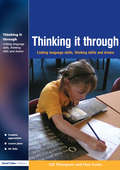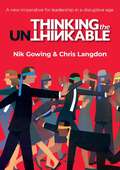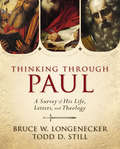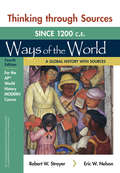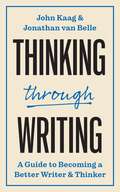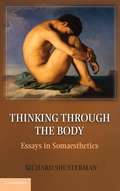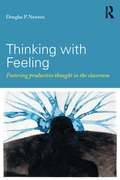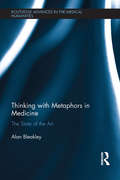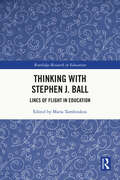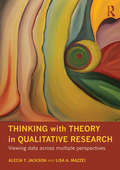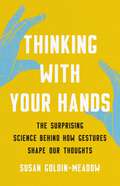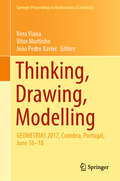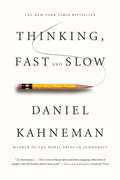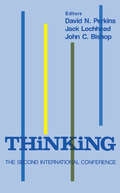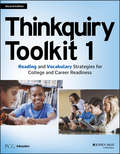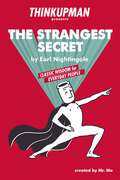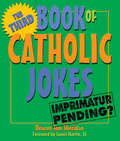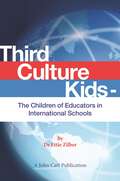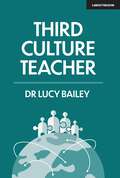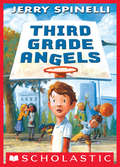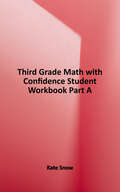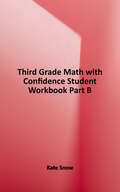- Table View
- List View
Thinking it Through: Developing Thinking and Language Skills Through Drama Activities
by Gill Thompson Huw EvansTeaching should be exciting and creative but an overcrowded curriculum can make this hard for teachers to achieve. Help is at hand with these literacy and numeracy lesson plans that also cover language development, thinking skills, and drama. Thinking it Through allows teachers to customize lesson plans to meet their own needs using the book's accompanying CD as well as assess pupils language abilty with handy photocopiable assessment worksheets. The book will help each child reach their full potential regardless of ability using ideas for differentiation and extension and structure lessons according to national curriculum objectives.
Thinking the Unthinkable: A new imperative for leadership in the digital age
by Chris Langdon Nik GowingExecutive leadership faces new vulnerabilities. Many leaders privately concede them, but few are willing to talk publicly about them. "Unthinkable" events since 2014 have revealed a new leadership fragility at the highest levels. And the pace of change in 2017 shows that the uncertainties are greater than ever. Is this the "new normal?"Thinking The Unthinkable is an investigation into why leaders have appeared more unable or unwilling than ever to anticipate the biggest issues of our time.In an era of "wicked problems" why are current leadership behaviours and culture apparently not fit for purpose? What are the causes of so many failures in policy and strategic forecasting? Are they human frailties? Or are they systemic failures to embrace smartly new realities?Through hundreds of interviews and conversations, Nik Gowling and Chris Langdon have analysed the deep new challenges to the human capacity of leaders at the highest keels to accept, understand, embrace then handle the extraordinary processes of change and disruption. This essential book draws on the candid responses. The findings are scary and disconcerting.
Thinking the Unthinkable: A new imperative for leadership in the digital age
by Chris Langdon Nik GowingExecutive leadership faces new vulnerabilities. Many leaders privately concede them, but few are willing to talk publicly about them. "Unthinkable" events since 2014 have revealed a new leadership fragility at the highest levels. And the pace of change in 2017 shows that the uncertainties are greater than ever. Is this the "new normal?"Thinking The Unthinkable is an investigation into why leaders have appeared more unable or unwilling than ever to anticipate the biggest issues of our time.In an era of "wicked problems" why are current leadership behaviours and culture apparently not fit for purpose? What are the causes of so many failures in policy and strategic forecasting? Are they human frailties? Or are they systemic failures to embrace smartly new realities?Through hundreds of interviews and conversations, Nik Gowling and Chris Langdon have analysed the deep new challenges to the human capacity of leaders at the highest keels to accept, understand, embrace then handle the extraordinary processes of change and disruption. This essential book draws on the candid responses. The findings are scary and disconcerting.
Thinking through Paul: A Survey of His Life, Letters, and Theology
by Bruce W. Longenecker Todd D. StillThe study of Paul and his letters can be exciting, challenging, and life-changing, but only if it is done well and only if students achieve more than a basic familiarity with the subject. This is exactly what Pauline experts Bruce W. Longenecker and Todd D. Still accomplish with their new textbook aimed at college and seminary level courses on Paul and his writings. Longenecker and Still bring decades of study and expertise to Thinking through Paul, challenging readers to delve deeply into Paul’s writings and wrestle with his richly-layered and dynamic theological discourse. Seeking to situate their study of the Apostle in proper perspective, Longenecker and Still first look at Paul’s life before and after his encounter with the risen Christ en route to Damascus, then examine each of Paul’s letters individually, and finally synthesize the Pauline writings to highlight the main strands of Paul’s theologizing—all the while keeping in mind the particular context of first-century Christianity. Filled with images, maps, charts, and questions for further study and discussion, Thinking through Paul is both engaging and easy-to-follow, making it the perfect choice for classrooms and for interested readers.
Thinking through Sources for Ways of the World: For the AP® MODERN Course
by Robert Strayer Eric NelsonDesigned as a companion reader to accompany Ways of the World Since 1200, each chapter contains a DBQ-like project of six to eight carefully selected written and visual primary sources organized around a particular theme, issue, or question. Each project is then followed by related secondary sources. Source include headnotes and questions intended to assist students in developing the skills required to read, analyze, and write about sources. Essay questions at the end of each chapter provide a starting point for classroom discussion or a written assignment.
Thinking through Writing: A Guide to Becoming a Better Writer and Thinker (Skills for Scholars #5)
by John Kaag Jonathan van BelleA concise and practical manual on developing reading, writing, and critical thinking skills in tandem For college students learning how to write on scholarly subjects, writing and critical thinking go hand in hand. And yet most books on these topics are categorized separately: writing guides and critical thinking handbooks. This book is different, offering a manual for developing reading, writing, and thinking skills in tandem. With short, practical chapters, Thinking through Writing helps readers learn to think critically about themselves and the world at large, read carefully and get the necessary literary support, write clearly and persuasively, stay on point, and finish their work as cleanly and compellingly as possible. Drawing on years of teaching critical thinking and writing, including almost a decade of teaching Harvard&’s freshman expository writing course, the authors invite readers to consider the intimate relationship between thinking and the creative, critical, self-actualizing act of writing.• Interviews with some of the most interesting and brilliant writers working today• Advice on how to structure an argument, write for an audience, work through writer&’s block and anxiety, and much more• Tips on how to make your writing unique and personal• Exercises and templates to help novice writers reach their full potential in practice
Thinking through the Body
by Richard ShustermanThis book provides a richly rewarding vision of the burgeoning interdisciplinary field of somaesthetics. Composed of fourteen wide-ranging but finely integrated essays by Richard Shusterman, the originator of the field, Thinking through the Body explains the philosophical foundations of somaesthetics and applies its insights to central issues in ethics, education, cultural politics, consciousness studies, sexuality, and the arts. Integrating Western philosophy, cognitive science, and somatic methodologies with classical Asian theories of body, mind, and action, these essays probe the nature of somatic existence and the role of body consciousness in knowledge, memory, and behavior. Deploying somaesthetic perspectives to analyze key aesthetic concepts (such as style and the sublime), he offers detailed studies of embodiment in drama, dance, architecture, and photography. The volume also includes somaesthetic exercises for the classroom and explores the ars erotica as an art of living.
Thinking with Feeling: Fostering productive thought in the classroom
by Douglas P. NewtonAre emotions good or bad for thinking and learning? Have you ever wondered why a good lesson of one year falls flat in another? Why do students behave the way they do? Teachers are expected to foster productive thought yet the neglect of emotion in the classroom, in favour of intellect, means teaching and learning is often not as effective as it might be.? Thinking with Feeling explores what we mean by productive thought, its interrelationship with mood and emotions, how teachers can manage that interaction to improve teaching and learning, and what teacher trainers could do about it. Synthesising the most important international research in the field, it offers a framework for productive, purposeful thought - deduction, understanding, creative thinking, wise thinking, and critical thinking - and explains how mood and emotion can support and also impede learning.? It considers the effect of the interplay of emotion and intellect on classroom behaviour, on students’ public performance and performance in tests, and how emotional labour can affect the teacher.? Illustrated with examples from practice, this challenging, thoughtful study offers education professionals a basis for understanding the interaction of emotions and cognition and making it a successful partnership in order to improve teaching and learning.
Thinking with Metaphors in Medicine: The State of the Art (Routledge Advances in the Medical Humanities)
by Alan BleakleyWhile medical language is soaked in metaphor, and thinking with metaphor is central to diagnostic work, medicine – that is, medical culture, clinical practice and medical education – outwardly rejects metaphor for objective, literal scientific language. This thought-provoking book argues that this is a misstep, and critically considers what embracing the use of metaphors and similes might mean for shaping medical culture, and especially the doctor–patient relationship, in a healthy way. Thinking With Metaphors in Medicine explores: how metaphors inhabit medicine – sometimes for the better and sometimes for the worse – and how these metaphors can be revealed, appreciated and understood; how diagnostic work utilizes thinking with metaphors; how patient–doctor communication can be better understood and enhanced as a metaphorical exchange; how the landscape of medicine is historically shaped by leading or didactic metaphors, such as ‘the body as machine’ and ‘medicine as war’, which may conflict with other values or perspectives on healthcare, for instance, person-centred care. Outlining the kinds of metaphors and resemblances that inhabit medicine and how they shape practices and identities of doctors, colleagues and patients, this book demonstrates how the landscape of medicine may be reshaped through metaphor shift. It is an important work for all those interested in the use of language and rhetoric in medicine, whether hailing from a humanities, social science or healthcare background.
Thinking with Stephen J. Ball: Lines of Flight in Education (Routledge Research in Education)
by Maria TamboukouThis edited volume explores how Stephen Ball’s work has shaped the field of the sociology of education worldwide. Written by internationally based researchers who are Ball’s former PhD students, it draws on different strands of his work to show what it means to think, write and do research inspired by Ball’s theory, methodology and epistemology. The contributions revolve around a wide range of themes including: the ethics of doing educational research, disability studies, the bio-politics of the child’s soul, lived experiences of marginalisation in education, educating migrant and refugee women in the borderlands and post-Brexit reflections on the Bologna process. Chapters draw on different lines of thought from the corpus of a significant and influential figure in the sociology of education to present, explicate and discuss a wide range of research projects, themes, theoretical directions, as well as methodological approaches in the field of the sociology of education today. More than celebrating Ball’s scholarship, this volume shows new and innovative directions in the sociology of education. It will be highly relevant reading for researchers, scholars, and students in the sociology of education, educational policy and politics and educational theory.
Thinking with Theory in Qualitative Research: Viewing Data Across Multiple Perspectives
by Alecia Youngblood Jackson Lisa A MazzeiWinner of the 2013 American Educational Studies Association's Critics Choice Award! Thinking With Theory In Qualitative Research shows how to use various philosophical concepts in practices of inquiry; effectively opening up the process of data analysis in qualitative research. It uses a common data set and utilizes various theoretical perspectives through which to view the data. It challenges qualitative researchers to use theory to accomplish a rigorous, analytic reading of qualitative data. "Plugging in" the theory and the data produces a variety of readings applying various theorists and their concepts, including: Derrida - Deconstruction Spivak – Postcolonial Marginality Foucault - Power/Knowledge Butler - Performativity Deleuze – Desire Barad – Material Intra-activity Thinking With Theory In Qualitative Research pushes against traditional qualitative data analysis such as mechanistic coding, reducing data to themes, and writing up transparent narratives. These do little to critique the complexities of social life; such simplistic approaches preclude dense and multi-layered treatment of data. It shows that "thinking with theory" pushes research and data and theory to its exhaustion in order to produce knowledge differently. By refusing a closed system for fixed meaning, a new analytic is engaged to keep meaning on the move. The result is an extension of thought beyond an easy sense. ? Special features of the book include schematic cues to help guide the reader through what might be new theoretical terrain, interludes that explain the possibilities of thinking with a particular concept and theorist and detailed chapters that plug the same data set into a specific concept. This vital tool will help researchers understand and fully utilize their powers of data analysis and will prove invaluable to both students and experienced researchers across all of the social sciences.
Thinking with Your Hands: The Surprising Science Behind How Gestures Shape Our Thoughts
by Susan Goldin-MeadowAn astounding account of how gesture, long overlooked, is essential to how we learn and interact, which &“changes the way you think about yourself and the people around you.&” (Ethan Kross, bestselling author of Chatter) We all know people who talk with their hands—but do they know what they&’re saying with them? Our gestures can reveal and contradict us, and express thoughts we may not even know we&’re thinking. In Thinking with Your Hands, esteemed cognitive psychologist Susan Goldin-Meadow argues that gesture is vital to how we think, learn, and communicate. She shows us, for instance, how the height of our gestures can reveal unconscious bias, or how the shape of a student&’s gestures can track their mastery of a new concept—even when they&’re still giving wrong answers. She compels us to rethink everything from how we set child development milestones, to what&’s admissible in a court of law, to whether Zoom is an adequate substitute for in-person conversation. Sweeping and ambitious, Thinking with Your Hands promises to transform the way we think about language and communication.
Thinking, Drawing, Modelling: GEOMETRIAS 2017, Coimbra, Portugal, June 16–18 (Springer Proceedings in Mathematics & Statistics #326)
by Vera Viana Vítor Murtinho João Pedro XavierThis book presents a selection of papers from the International Conference Geometrias’17, which was hosted by the Department of Architecture at the University of Coimbra from 16 to 18 June 2017. The Geometrias conferences, organized by Aproged (the Portuguese Geometry and Drawing Teachers’ Association), foster debate and exchange on practical and theoretical research in mathematics, architecture, the arts, engineering, and related fields.Geometrias’17, with the leitmotif “Thinking, Drawing, Modelling”, brought together a group of recognized experts to discuss the importance of geometric literacy and the science of representation for the development of scientific and technological research and professional practices. The 12 peer-reviewed papers gathered here show how geometry, drawing, stereotomy, and the science of representation are still at the core of every act leading to the conception and materialization of form, and highlight their continuing relevance for scholars and professionals in the fields of architecture, engineering, and applied mathematics.
Thinking, Fast And Slow
by Daniel KahnemanFirst is fast, intuitive, and emotional; Second is slower, more deliberative, and more logical. The impact of overconfidence on corporate strategies, the difficulties of predicting what will make us happy in the future, the profound effect of cognitive biases on everything from playing the stock market to planning our next vacation--each of these can be understood only by knowing how the two systems shape our judgements and decisions. <p> <b>New York Times Bestseller</b>
Thinking: The Second International Conference (Psychology Library Editions: Cognitive Science Ser.)
by John Bishop Jack Lochhead D. N. PerkinsFirst published in 1987. Routledge is an imprint of Taylor & Francis, an informa company.
Thinkquiry Toolkit 1: Reading and Vocabulary Strategies for College and Career Readiness
by PCG EducationEssential, easy-to-implement tools for teachers to help improve literacy across the content areas, as mandated by the CCSS Thinkquiry Toolkit 1, Second Edition, is a collection of teacher instructional practices, student learning strategies, and collaborative routines that improves reading comprehension and vocabulary learning in grades 4 through 12. Each practice, strategy, or routine is research-based, high impact, multi-purpose and effective in improving student learning across multiple content areas. It addresses the importance of the ability to read, write, speak, listen, and think well enough to learn whatever one wants to learn, to demonstrate that learning, and to transfer that learning to new situations. Thinkquiry Toolkit 1 iscomprised of five sections: Overview of the Common Core State Standards for English Language Arts & Literacy and the related instructional shifts Selecting the Right Tools for Maximum Learning Laying the Foundation Before Reading/Learning Building New Knowledge During Reading/Learning, and Expanding and Deepening Understanding After Reading/Learning If teachers collaboratively use these practices, strategies, and routines; teach them to students; and use them regularly across content areas, students will develop confidence and competence as readers, writers, and learners. A division of Public Consulting Group (PCG), PCG Education provides instructional and management services and technologies to schools, school districts, and state education agencies across the U.S. and internationally. They apply more than 30 years of management consulting expertise and extensive real-world experience as teachers and leaders to strengthen clients' instructional practice and organizational leadership, enabling student success.
Thinkupman presents: Classic Wisdom for Everyday People
by MoHere’s a sobering statistic: by the age of 65, on average only 5% of us will have achieved success. “Yeah, right. . . ” you might say, “Success is subjective; there is more than one version of what it means to be successful.” <p><p> The author of this book disagrees with you. Along with Jeff Bezos, Bill Gates, Warren Buffet, Mark Zuckerberg, and all the other billionaires on earth. Here is the absolute, best definition of what it means to be successful: success is the progressive realization of a worthy ideal. <p> In other words, success is when an individual who knows what they want to do works towards achieving their dream. That sentence alone gives you clues into the strangest secret on how to achieve a life of prosperity and success. The key is setting a goal, creating a plan to achieve said goal, and following through. <p> Written by Earl Nightingale, who in 1941 was aboard the USS Arizona during the attack on Pearl Harbor. Mr. Nightingale was just one of the fifteen surviving Marines. This experience, combined with the maxim “As ye sow, so shall ye reap,” inspired Mr. Nightingale to embark on a new path, anchored in the philosophy that each of us becomes what we think about. We become what we think about--is an idea that has echoed through the ages, from the Bible to preeminent thinkers of today. Despite this, most of us choose to ignore this precept. <p> THINKUPMAN introduces The Strangest Secret, rewritten in a fun and easy-to-understand way for modern audiences, whether they’re in their high school years or golden years. With fun and insightful illustrations, comic strips, and everyday English, audiences new to this inspiring and penetrating totem as well as those familiar with the text will be pleased at this entertaining and life-changing slender volume, as presented by THINKUPMAN.
Third Book of Catholic Jokes
by Deacon SherdianAs Pope Benedict XVI has said, "A writer once said that angels can fly because they don't take themselves too seriously. Maybe we could also fly a bit if we didn't think we were so important." Imagine the pontiff, now in his eighties and undoubtedly feeling the pains of growing older himself, cracking a joke about it to one of the cardinals in the Vatican. So must every married couple do as they go about the business of maintaining a loving, committed relationship...but discover that they still get on each other's nerves occasionally.Here is The Third Book of Catholic Jokes, chosen and told by Deacon Tom Sheridan, the former editor of The Catholic New World, the newspaper of the Archdiocese of Chicago. He is now retired and living with his wife in Florida. The book also features a Foreword by Father James Martin, SJ, the culture editor of America magazine and the author of Between Heaven and Mirth: Why Joy, Humor and Laughter Are at the Heart of the Spiritual Life.This edition of this popular series of books focuses on the universal--and often hilarious--human experience of relating to one another and growing old together. These stories, jokes, lists, and one-liners are mostly about lay people and are told from a "Catholic" (that is, Roman Catholic) or a "catholic" (that is, universal and about everyone) perspective. They are "clean" and not "mean" and are certainly not intended to offend anyone of any faith or situation in life. But if we can't make fun of ourselves about the difficulties of growing older or trying to maintain our most intimate relationships over a lifetime, then how can we ever expect to "fly a bit"?
Third Culture Kids: The Children of Educators in International Schools
by Ettie ZilberThe concept of the Third Culture Kids (TCKs), children who follow their globetrotting parents around the world, is not a new one and has been widely studied. However, there is one specific group of TCKs who have, until now, been largely ignored EdKids, the children of international school educators.
Third Culture Kids: The Children of Educators in International Schools
by Ettie ZilberThe concept of the Third Culture Kids (TCKs), children who follow their globetrotting parents around the world, is not a new one and has been widely studied. However, there is one specific group of TCKs who have, until now, been largely ignored EdKids, the children of international school educators.
Third Culture Teacher
by Lucy BaileyDr Lucy Bailey presents a concise and coherent guide for those who are interested in pursuing a teaching career internationally. This book covers all the things you should consider as well as the advantages and disadvantages of living and working in an entirely new culture and country that you might face.If you've ever considered taking the big leap, looking for a new adventure, and relocating to a completely different country, continent or time zone, then this book will guide you through the steps and help you answer all the big questions to figure out if it's really for you. This is a book that is applicable both for those who are looking to take the journey on their own or with their immediate family.Written by someone who has made the move herself and lived in over four different countries with her husband - who is an international school headteacher - and their four daughters, Dr Lucy Bailey provides essential, key information and more than useful advice.
Third Culture Teacher: 2019
by Lucy BaileyDr Lucy Bailey presents a concise and coherent guide for those who are interested in pursuing a teaching career internationally. This book covers all the things you should consider as well as the advantages and disadvantages of living and working in an entirely new culture and country that you might face.If you've ever considered taking the big leap, looking for a new adventure, and relocating to a completely different country, continent or time zone, then this book will guide you through the steps and help you answer all the big questions to figure out if it's really for you. This is a book that is applicable both for those who are looking to take the journey on their own or with their immediate family.Written by someone who has made the move herself and lived in over four different countries with her husband - who is an international school headteacher - and their four daughters, Dr Lucy Bailey provides essential, key information and more than useful advice.
Third Grade Angels
by Jerry SpinelliThe long-awaited prequel to the bestseller FOURTH GRADE RATSGeorge, aka "Suds," has just entered third grade, and he's heard the rhyme about "first grade babies/second grade cats/third grade angels/fourth grade rats," but what does this mean for his school year? It means that his teacher, Mrs. Simms, will hold a competition every month to see which student deserves to be awarded "the halo" - which student is best-behaved, kindest to others, and, in short, perfect. Suds is determined to be the first to earn the halo, but he's finding the challenge of always being good to be more stressful than he had anticipated. Does he have to be good even outside of school? (Does he have to be nice to his annoying little sister?) And if Mrs. Simms doesn't actually see him doing a good deed, does it even count?A warm, funny return to elementary school from master storyteller Spinelli.
Third Grade Math With Confidence Student Workbook Part A (Math With Confidence Ser.)
by Kate SnowLearn third-grade math with confidence! Use Workbooks Part A and Part B to teach and reinforce the lessons in the Third Grade Math with Confidence Instructor Guide. Use Workbooks Part A and Part B to teach and reinforce the lessons in the Third Grade Math with Confidence Instructor Guide. These colorful, whimsical pages support you in your teaching and give your child written practice with new concepts and review of previously-learned skills. - Lesson activity pages include visual aids, real-world examples, and game boards to simplify your teaching - Practice pages provide written practice with new skills - Review pages ensure students retain what they’ve learned and master essential skills - Unit Wrap-Ups at the end of each unit provide review and assessment You’ll use Workbook Part A for Units 1-8, and Workbook Part B for Units 9-16. Together with the Instructor Guide, these books provide a full year of thorough and engaging math instruction.
Third Grade Math With Confidence Student Workbook Part B (Math With Confidence Ser. #0)
by Kate SnowLearn third-grade math with confidence! Use Workbooks Part A and Part B to teach and reinforce the lessons in the Third Grade Math with Confidence Instructor Guide. Use Workbooks Part A and Part B to teach and reinforce the lessons in the Third Grade Math with Confidence Instructor Guide. These colorful, whimsical pages support you in your teaching and give your child written practice with new concepts and review of previously-learned skills. - Lesson activity pages include visual aids, real-world examples, and game boards to simplify your teaching - Practice pages provide written practice with new skills - Review pages ensure students retain what they’ve learned and master essential skills - Unit Wrap-Ups at the end of each unit provide review and assessment You’ll use Workbook Part A for Units 1-8, and Workbook Part B for Units 9-16. Together with the Instructor Guide, these books provide a full year of thorough and engaging math instruction.
